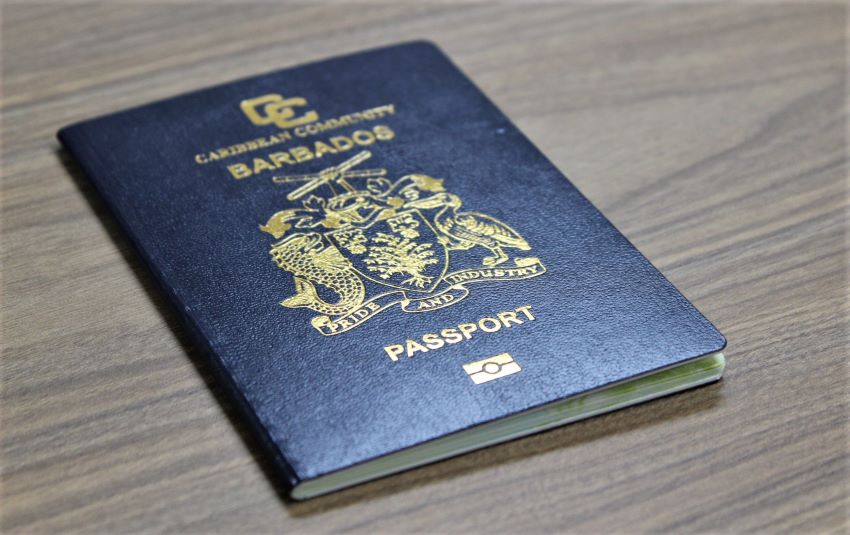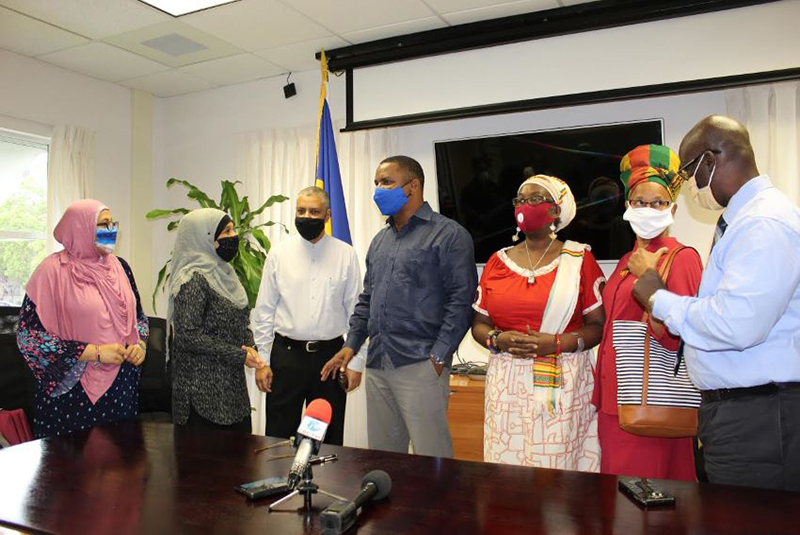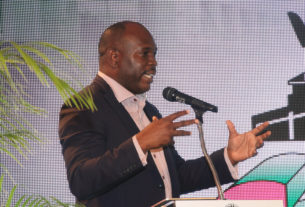Minister of Home Affairs, Wilfred Abrahams (centre), in discussion with President of the Barbados Association of Muslim Ladies, Sakina Bakharia (left); Secretary, Ferozah Kothdiwala (second left), and Secretary of the Barbados Muslim Association, Suleiman Bulbulia. Also pictured are Chairperson for the Ichirouganaim, Asheba Trotman; Elder of the Rastafari Community, Keturah Babb; and Chief Immigration Officer, Wayne Marshall. (GP)
Barbadians whose religious beliefs mandate that they keep their heads covered, will no longer be required to remove their headdress to take official photographs.
This follows Cabinet approval on Thursday, October 1, for the wearing of head coverings for religiously mandated purposes during the taking of official photographs, such as the Barbados Identification Card, passport and driver’s licence.
Minister of Home Affairs, Information and Public Affairs, Wilfred Abrahams, made the announcement during a press conference at the Ministry’s Wildey, St. Michael office this morning.
“The standard is that you must not cover your head. That is a general standard and the general law in Barbados. However, if you are a member of a recognised religion in Barbados… and your religion mandates that you cover your head, or cover your ears, then you are free to take your passport photograph once you provide proof…for the Chief Immigration Officer that you are a member of that religious organisation, and that religious organisation does have these rules in place…,” he stated.
The Minister explained that representatives from the Muslim and Rastafari communities raised the issue of discrimination with Government, stating that they should be allowed to practise the edicts of their respective faiths.
Mr. Abrahams said the Chief Immigration Officer advised that there were standards established by the International Civil Aviation Organization (ICAO) regarding photographs for e-passports.
“The ICAO guidelines on passport requirements state that the head coverings are not permitted, except for religious reasons, but the facial features from the bottom of the chin to the top of the forehead and both edges of the face must be clearly shown…,” he said.
The Minister further pointed out that Barbados accepted passports from persons of other religions arriving from countries such as the United States, Australia and Canada, which allowed for head coverings.
“So, if we would accept that for other countries, there was really no good reason why we should continue to discriminate…against the religious practices of our brothers and sisters in Barbados,” he stated.
Mr. Abrahams stressed that the principle was one of general application and was not gender specific, as it applied to both males and females.
He also gave members of the Muslim and Rastafari community the assurance that Government was working to address instances of indignity, discrimination and anomalies when they were brought to its attention.

“I have to respect your religious beliefs in the same way that I wish you to respect mine. As a country, we need to remove all stigmas and all aspects of discrimination wherever we find them and wherever they impact or affect the citizens of Barbados,” Mr. Abrahams maintained.
The move has been welcomed by members of the Muslim and Rastafari communities.
President of the Barbados Association of Muslim Ladies, Sakina Bakaria, said the organisation fully supported the move as past challenges had prevented many Muslim women from renewing their official documents.
“I have not renewed my Barbados passport for a number of years, because I have another one that I can travel on that allows me to wear my hijab. So, it is a stepping stone. It is wholeheartedly appreciated by our entire community,” Mrs. Bakaria stated.
Similar sentiments were echoed by Chairperson for the Ichirouganaim, Asheba Trotman, who thanked Government for its acknowledgement of them as a spiritual and cultural people.
Noting that the discrimination was ongoing for the last 30 to 40 years, Ms. Trotman explained that one of their greatest challenges was with the Immigration personnel and having to remove their head wraps in front of hundreds of people.
A refusal, she said, usually meant they would be taken to a room as if they were a security risk.
Secretary of the Barbados Muslim Association, Suleiman Bulbulia, also expressed his gratitude for the move by Government. “The true test of a democracy is how it [a government] treats its minorities. And Barbados is standing to that test and coming out with flying colours by enacting rules and regulations like these that allow for minority groups, and people of different faiths and cultures to be able to express that even with national photographs, and so on. So, we are extremely grateful [and] thankful that we have reached this stage after so many years,” he stated.
julia.rawlins-bentham@barbados.gov.bb
Bio-Data Page In Passports Discontinued

(FP)
The requirement for a bio-data page in the Barbados passport has been discontinued with immediate effect.
Minister of Home Affairs, Information and Public Affairs, Wilfred Abrahams, made this announcement today as he addressed a press conference at the Ministry’s Wildey, St. Michael office.
The Minister explained that the bio-data page in the passport located at page 30 contained information such as a person’s height, their hair colour and eyes, and occupation.
“This is an irrelevant page. It is not required by law. The passport and the chip inside the passport can produce all that data and it is entered in the system so it doesn’t have to be in the passport…. So that page is wholly unnecessary,” he emphasised.
Mr. Abrahams explained that the bio-data page was not printed in the same printer as the Barbados passport.
He noted that after the passport was printed, it was taken to another department and the information on the bio-data page physically entered and then printed from another station.
“That is a waste of time…. So Cabinet also agreed, based on the recommendation of the Chief Immigration Officer, and our need to streamline what it is that we’re doing, that effective immediately, there’s no requirement for the bio-data page in a Barbadian passport,” Mr. Abrahams stated.
julia.rawlins-bentham@barbados.gov.bb




